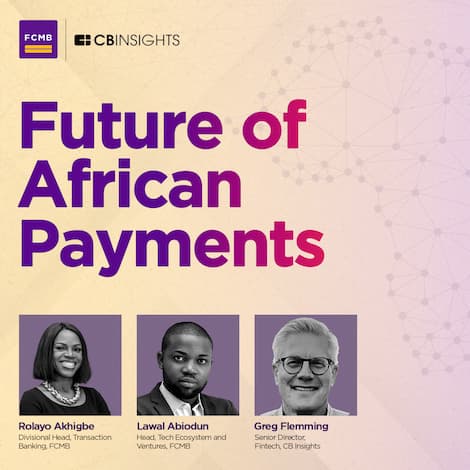
At every corner you turn in the African business ecosystem is a banking solution. Proliferating among these banking solutions are fintech startups mainly focused on solving payments and building infrastructure aimed at enabling easier transactions. Currently, when It comes to real-time transaction rankings, Nigeria ranks among the top 10.
With over 500 fintechs in Africa and fintech funding reaching $300 million in 2022, it’s clear that payment solutions are a hot topic in the African finance ecosystem. With a fast-growing population, which also means commercial transactions are increasing, the question of the future of payments in Africa has become pertinent.
To answer this question, FCMB, in partnership with CB Insights, set up a webinar on December 9, 2022 to discuss the evolution of payments on the continent so far and what the future holds. This webinar themed “The future of African Payments” was anchored by Rolayo Akhigbe, divisional head, transaction banking at FCMB; Greg Flemming, head of fintech research at CB Insights; and
Lawal Abiodun, head, tech ecosystem and ventures at FCMB.
The state of the industry
To open the webinar Greg Flemming referenced a quote from a 2022 Mckinsey & Co report that states that “between 2020 and 2025, the e-payments market will grow by around 150 percent to reach almost $40 billion in revenues from domestic payments alone, with about 188 billion in transaction volumes”. According to this, Africa has barely scratched the surface when it comes to the potential that resides within payments. Presenting stats from CB Insights, he showed the fintech opportunities that reside in Africa and the growth of digital payments so far.
According to the CB Insights data, fintech funding in Africa peaked in the third quarter of 2021 at $1,063 million, with Wave, Opay, and MNT-Halan raking in the most funding. While fintech funding globally took a hit in 2022, the funding rise in Africa continued in much of 2022, reaching $383 million in the second quarter, before slowing down in the third quarter at $161 million. The data presented also indicated that the African fintech space is dominated by early-stage startups; 90% of fintech companies are early-stage and the three top-funded companies currently dominating the African space—MFS, Cellulant, and Yoco—are focused on enabling digital payment transactions. In the 2021 CB Insights 250 report, which is a yearly report of the 250 most promising fintech companies globally, six of these companies currently operate in Africa and four out of the six are focused on payment solutions and/or mobile wallets. What these stats indicate is that investors see a massive opportunity in the African payment space.
According to CB Insights data, informal retail dominates the sub-Saharan marketplace and drives employment. Ninety percent of transactions are performed through informal means and the sector also provides 80% of employment in sub-Saharan Africa. One thing aiding trade in the region is mobile money transactions, and Africa alone accounts for 70% of mobile money transactions, globally.
According to Flemming, the factors driving this growth and the potential for digital payments to continue to grow in the region are the large youth population, which is more open to adopting modern digital payment methods. Also, alternative technologies, especially technology that is not as dependent on internet connection, like mobile money, are being created. Lastly, payment infrastructure is advancing and improving transactions and this also adds to this growth.
The problem:
Despite the investment in fintech growth and the proliferation of payment solutions dominating the ecosystem, cash is still king in Africa. Ninety percent of household retail transactions are made in cash and less than 5% of the adult population own a credit card. With retail payments estimated to reach 2.1 trillion by 2025 and a large informal retail market, there is still a massive opportunity in the African market to provide cashless solutions, especially for businesses.
The future of African payments
According to Akhigbe, when it comes to the evolution of payments in Africa, mobile solutions have the greatest potential in Africa; and as nearly all adults now use a phone, innovations are going to be tailored around current mobile devices. She states, “What I see in 2023 is how people are going to use mobile technology to leverage reaching broader horizons. What I think is going to happen, especially as we see more network reliability across Africa, is that there’s going to be a lot more USSD use. We may have more smart app solutions, but I don’t think USSD is going to go away.”
What she attributes this faith in USSD to is the size of the rural population. Despite urban growth, there are a lot more rural areas and because these areas are not as profitable for telcos and internet providers, payment providers will have to leverage on USSD technology.
On the question of what role traditional financial institutions will play in this future, Akhigbe stated that evolution and collaboration are the present and future. Speaking from her years of experience, she noted that at the advent of fintech startups on the continent, the concern was that they had come to displace existing traditional banks, but with time, this relationship has become more of a symbiotic partnership. Banking, as we know it, has evolved. Banks now function as platforms for fintechs and their innovative ideas to connect with a customer base. This partnership works because the banks have an already established customer base and therefore customer trust and loyalty which has been built with time, and the fintechs have innovative technology and solutions. According to Akhigbe , once a fintech solution checks all the right boxes for traditional banks, including security and utility, then partnerships are formed. This partnership, she adds, will also include telcos. Telcos have a large database and technology, but they are hindered by Central Bank regulations on financial services, and so they need the financial expertise of the banks.
According to Flemming, going by global trends and innovations, super-apps like WeChat and Alipay, which have gained a strong hold on the younger generation, are going to become more common. These apps condense a wide variety of functions around payments into one platform. He also added that cross-border and cross-currencies payment innovations are also going to be a major focus ahead.
Both Akhigbe and Flemming spoke about the tremendous growth in the adoption of digital currencies. These digital currencies are not cryptocurrencies and are backed by fiat currency, meaning they’re simply digital iterations of existing fiat currency. In Africa, specifically Nigeria, despite having the technology and the Central Bank going to lengths to make the e-naira available, adoption is still low. This Akhigbe attributes to value proposition. What can it be used for and what infrastructure is it built on? She thinks digital currencies like the e-naira do not fit into the ecosystem right now. There’s a bit more work that is needed, especially in the area of creating utility.
Speaking on cryptocurrencies, Flemming noted that cryptocurrency use varies regionally and in some places it is treated as an asset class, and in others as a means of transaction. The question now, according to him is, does the proliferation of other digital currencies and digital payment means eliminate the need for cryptocurrencies, or do people continue to use them for their investment potential? This is a question he’s waiting to see the outcome of in the future. Piggybacking on this point Akhigbe noted that in the African space, crypto is more transactional and is also often used for cross-border payments. This is what led to the crypto ban in Nigeria as the government tries to understand and maintain control over monetary transactions within its borders. She concluded by stating that she doesn’t think crypto is going away soon because of the demand and its utility.
To see more of this conversation and keep up with the future of African payments, click here.
About Us
First City Monument Bank
First City Monument Bank (FCMB) Limited is a member of FCMB Group Plc, which is one of the leading financial services institutions in Nigeria with subsidiaries that are market leaders in their respective segments. Having successfully transformed into a retail banking and wealth management-led group, FCMB expects to continue to distinguish itself through innovation and the delivery of exceptional services.
Hub One (by FCMB)
Hub One is a physical representation of the FCMB’s commitment and determination in developing the technology ecosystem in Nigeria. This is a registered trademark of the bank created to drive our agenda in the tech space. It is driven by our vision of being the preferred financial service institution to Tech start-ups and key players in the Tech Ecosystem.
What startups get at Hub One:
- Discounted API services for embedded finance (including virtual wallets, payments, cards validation etc.)
- Premium Banking services with 3 months free banking and discounted domiciliary account charges.
- Equity/Debt investments with average ticket size of 400k USD.
- Operational funding for your transactions.
- Access to FCMB markets (over 2 million subscribers).
- Co-working space etc.
Press Contact:
Abiodun Lawal, Head, Tech Ecosystem and Ventures
https://www.linkedin.com/in/lawalabiodun/
08107813382
CB Insights
CB Insights helps the world’s leading companies make smarter technology decisions with data, not opinions. We provide data, analytics and insights that illuminate the vendors and technologies transforming industries worldwide.

















